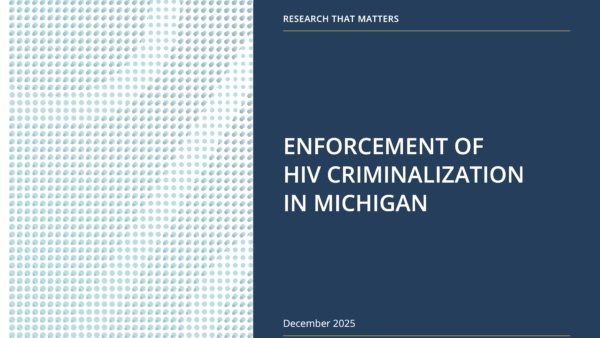Laws requiring individuals with HIV to disclose their status before sex are assumed to be in place to protect people. Often these laws are framed as protection for women. In a 2012 Supreme Court of Canada decision that made the law governing HIV non-disclosure stricter, the judges indicated a particular concern for “the trusting wife.”
But the intent of a law is one thing. The impact is another.
The reality of the law related to HIV is that it endangers women on both sides of the courtroom.
Women living with HIV already experience more severe and frequent violence in relationships. With the new law, they also live under threat of prosecution.
The law provides abusive partners with another tool of control. A man can threaten to go to the police with claims that a woman with HIV did not inform him of her status; he can blackmail her into staying with him; and by actually taking his allegations to the police he can punish her for leaving. The onus is then on the accused woman to prove that she did disclose.
The use of the law for revenge was clearly seen in the Supreme Court case regarding a woman in Quebec living with HIV. She had lived with a man for four years, and he knew her HIV status. She ended the relationship after he became violent, and for that he viciously attacked her and her son. The man was charged and found guilty of assault–but then was let off the hook when he called the police and claimed the woman had not told him she had HIV before they first had sex years ago. Unbelievably she became the aggressor in the eyes of the law, and thus began her eight-year legal nightmare.
Most prosecutions for HIV non-disclosure target men who had sex with women. In this sense the law might seem to offer recourse for women. But testifying against a former partner does not bring the sense of relief that might be expected.
When the Crown compels a woman to testify against a former partner, she comes under tremendous pressure. Taking the stand does not simply require her to tell her story. Having to face an ex with whom she had a complicated relationship, who may also have been abusive, can retraumatize her. The stress of having to testify takes a toll on her physical and mental health and can lead to illness and even breakdown. Often women are unaware that they can testify from a separate room or get a doctor’s note excusing them from appearing in court because of the detriment to their health. If they have recently moved to Canada, they may be scared that failure to testify will result in loss of their immigration status.
A woman also faces the possibility of reprisals for testifying. Women have had their personal safety threatened by the men they are testifying against and the men’s families. A woman’s family may also be threatened. If she is from another country, these threats may even be applied to extended family she has there.
Testifying also presents a likelihood of outing a woman as having HIV. Although media are prohibited from reporting the names of witnesses, confidentiality cannot be guaranteed. People can see who goes to court, and communities are small enough that people know who’s involved in a case. A woman’s HIV status is no longer private.
At the conclusion of trials, women who were compelled to testify have stated that the process did not bring them any closure. Instead it resulted in a profound sadness.
Whether women are sitting in court as the accused or as witnesses for the prosecution, the outcomes are similar. They experience intense stress, pressure, and trauma. Their health, their families, and their communities suffer.
Although the law may seem to offer protection and an avenue for justice, in practice there is little to be gained for women through the criminalization of HIV non-disclosure. Rather than slapping criminal charges on people with HIV and pursuing them through the courts, we should focus on decreasing stigma and fostering an environment where HIV disclosure can be done safely and without fear.









